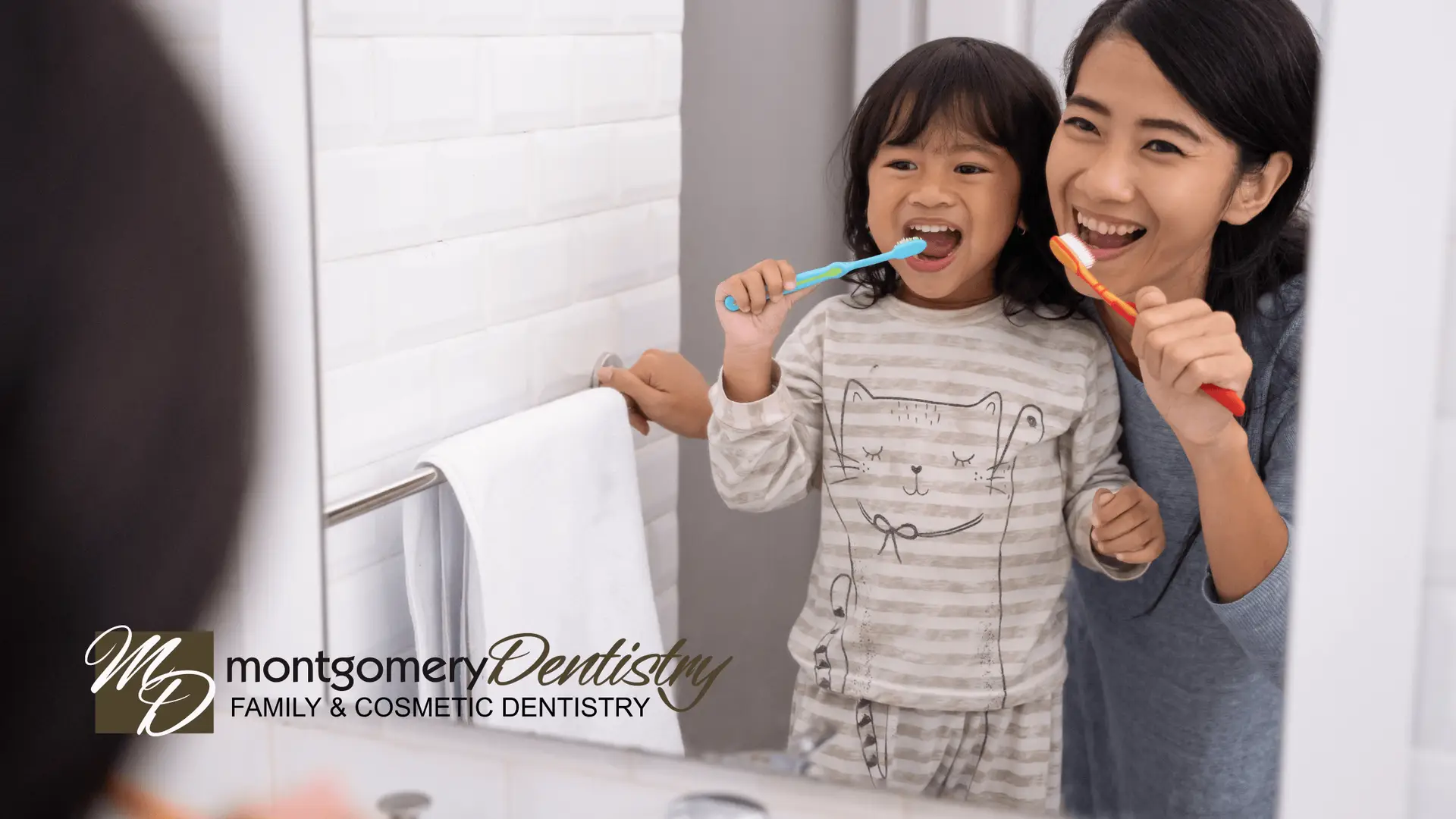August 22 is National Tooth Fairy Day! Kids around the world love taking part in the fun tradition of placing a lost baby tooth under their pillow at night and waking up to a surprise from the Tooth Fairy. Just how important are those baby teeth the fabled Tooth Fairy collects, and how can you keep them in great shape until they fall out? Let’s take a closer look and learn all about baby teeth!
When will my child start getting their baby teeth?
Babies are typically born with a set of 20 baby teeth hidden under their gums. Most children’s lower front teeth start appearing at around 6 months of age. The rest of the teeth will erupt over time, and your child will most likely have their full set of baby teeth by the time they’re 3 years old.
Here are a few common symptoms and signs of initial teething:
- General irritability
- Low-grade fever (98-100 degrees)
- Ear rubbing
- Poor sleep
- Excessive drooling
- Frequent chewing and biting
- Red and swollen gums
When should I start brushing my child’s baby teeth?
It’s important to recognize that your child’s at-home oral care routine actually needs to start well before their first baby tooth erupts. Starting soon after birth, it’s important to clean their gums after meals and before bed with either a clean, damp washcloth or an infant toothbrush to cut down on bacteria growth.
That being said, it’s generally a good idea to start brushing your child’s baby teeth as soon as that first tooth comes in when they’re about 6 months old. This will keep their oral health in good condition and start promoting healthy dental hygiene habits early on.
What’s the best way to brush my child’s baby teeth?
Baby teeth need to be brushed twice a day just like adult teeth. Start out by using a soft-bristled toothbrush designed for infants and apply a rice-grain-sized amount of non-fluoridated toothpaste. Then, gently brush your child’s baby teeth and gums in a circular motion for a total of two minutes. When your child turns 3, you can increase the amount of toothpaste used to a pea-sized amount and keep the same brushing routine. Once your child is 5 or 6, you can swap to an enamel-strengthening fluoridated toothpaste. Don’t forget to gently floss between any baby teeth that are touching!
What else can I do to prevent my child’s baby teeth from decaying?
Decay is essentially the result of sugars and acids sticking around on the teeth and gums for stretches of time without being properly brushed or wiped away. If you want to prevent your child’s baby teeth from decaying, avoid putting them to bed with formula, milk, juice, or any sugary drinks. You should also ensure they’re consuming sweet or sticky foods in moderation if you want to cut down on the chance of decay.
Why do baby teeth matter if they’re going to fall out eventually anyway?
It may seem logical to think that baby teeth don’t really matter since they aren’t going to stick around forever, but this is not the case at all. Baby teeth act as placeholders for adult teeth and help guide those permanent teeth into position, so it’s important to take care of them so they can stay in place as long as needed. Healthy baby teeth are also essential for your child’s early development of chewing and speech patterns.
What happens if one of my child’s baby teeth develops a cavity?
If your child is complaining of tooth sensitivity or seems to be in pain when they eat, they may have developed a cavity. Other signs include visible pits and discoloration of the teeth. Contact your child’s dentist as soon as possible so they can come up with a plan to address the cavities and save the teeth. Typical treatments for cavities in baby teeth include fillings, crowns, and bridges.
How can pacifiers and thumb sucking affect my child’s baby teeth?
The American Association of Orthodontists reports that prolonged pacifier use and thumb sucking beyond age 3 can negatively affect the formation of your child’s teeth and jaws over time. These habits could result in protruding front teeth or bite issues, both of which may cause speech or swallowing problems. You can mitigate these issues by providing positive reinforcement for not engaging in the habits or helping your child find other ways to self-soothe.
You can also bring up your concerns with your child’s dentist. Their dentist will be able to see if any problems related to pacifier use or thumb sucking are developing, and they’ll be able to offer advice unique to your child’s behavior and habits.
When can my child start brushing their own teeth?
This is completely dependent on each individual child. However, most children are ready to start brushing their teeth completely on their own by the time they’re 8 years old. Until then, you can encourage your child to practice brushing their teeth and spitting out excess toothpaste and saliva while you supervise them starting at around 3 years old.
When will my child’s baby teeth start falling out?
Baby teeth typically begin to fall out on their own around the age of 6, and they’ll usually keep falling out as the permanent teeth move in until your child is approximately 12 years old. The first teeth to fall out tend to be the first to come in: the lower front teeth.
What should I do if my child has a loose baby tooth?
It’s typically okay for your child to be a little curious and gently wiggle their loose baby teeth with clean hands or poke at them with their tongue. Until those loose baby teeth fall out, make sure you (or your child) are still gently brushing around them to avoid gum inflammation or decay in adjacent teeth.
What should I do when one of my child’s baby teeth falls out?
Baby teeth will usually fall out on their own within a few weeks after initially becoming loose, but sometimes they might need a little help if it gets past that point and your child is experiencing discomfort. In cases where a baby tooth is extremely loose, you (or your child if they’re comfortable doing so) can use clean hands or a piece of sterile gauze to gently pull on the tooth and remove it.
There may be some bleeding from the gums when one of your child’s baby teeth falls out. Usually, all your child needs to do is swish some warm water in their mouth and they’ll be good to go. Heavier bleeding can be addressed by having your child bite down on sterile gauze. If the bleeding doesn’t stop within an hour, it’s time to call your child’s dentist and ask for their advice.
What should I do if my child’s baby tooth is knocked out?
As with any dental emergency, consulting your child’s dentist and bringing them in for an exam if necessary is the safest course of action if one of their baby teeth is knocked out. Until you can get to the dentist’s office, make sure to rinse your child’s mouth out with water to clear away any debris or blood. If their mouth is actively bleeding, applying gentle pressure with a piece of wet gauze or a cold washcloth can help. You can also give your child appropriate over-the-counter pain relievers or have them hold a cold ice pack against their jaw to ease discomfort.
Note: If you notice your child has trouble breathing after their baby tooth is knocked out and you cannot locate the tooth, call 911 or go to the emergency room because they may have inhaled the tooth or a piece of it.
Ready to schedule your child’s first dental exam and cleaning? Need a little extra guidance when it comes to caring for their baby teeth? Call Montgomery Dentistry at (334) 279-0760 today!
About the Author
-

Dr. Amy Morrison Anderson
Dr. Amy Morrison Anderson joined our practice in July 2005. She is a lifelong resident of Montgomery, and a graduate of Jefferson Davis High School, Auburn University, and the University of Alabama, Birmingham School of Dentistry.
She is a member of the American Dental Association, the Alabama Dental Association, and the Academy of General Dentistry.
Dr. Anderson most enjoys doing veneers. “The reward of seeing my patients’ self-confidence and self-esteem boosted by a beautiful smile is immeasurable.”
Brandon, her husband, is also a graduate of Jefferson Davis High School and Auburn University. They have one daughter, Bailey Elizabeth, and twin sons, Caden and Cole.
